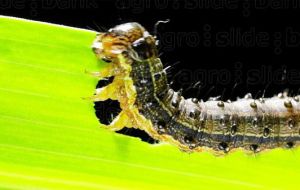MercoPress. South Atlantic News Agency
Crop destroying caterpillar rapidly spreading across Africa; maize production endangered
 Fall armyworm is native to the Americas and can devastate maize production, the staple food crop that is essential for food security in large areas of Africa.
Fall armyworm is native to the Americas and can devastate maize production, the staple food crop that is essential for food security in large areas of Africa. New research announced by scientists at CABI (Center for Agriculture and Bioscience Information) confirms that a recently introduced crop-destroying armyworm caterpillar is now spreading rapidly across Mainland Africa and could spread to tropical Asia and the Mediterranean in the next few years, becoming a major threat to agricultural trade worldwide.
Fall armyworm is native to North and South America and can devastate maize production, the staple food crop that is essential for food security in large areas of Africa. It destroys young plants, attacking their growing points and burrowing into the cobs.
An indigenous pest in the Americas, it has not previously been established outside the region. In the past year, it was found in parts of West Africa for the first time and now a UK based CABI-led investigation has confirmed it to be present in Ghana. It can be expected to spread to the limits of suitable African habitat within a few years.
Plant doctors working in CABI’s Plantwise plant clinics, which work to help farmers lose less of what they grow, have found evidence of two species of fall armyworm in Ghana for the first time. This has been confirmed by DNA analysis undertaken at CABI’s molecular laboratory in Egham, Surrey (UK). In Africa, researchers are working to understand how it got there, how it spreads, and how farmers can control it in an environmentally friendly way.
CABI Chief Scientist, Dr. Matthew Cock said, “We are now able to confirm that the fall armyworm is spreading very rapidly outside the Americas, and it can be expected to spread to the limits of suitable African habitat within just a few years. It likely travelled to Africa as adults or egg masses on direct commercial flights and has since been spread within Africa by its own strong flight ability and carried as a contaminant on crop produce.”
Known as the fall armyworm because it migrates into temperate North America in Autumn (fall), this pest has long been a problem throughout tropical America, damaging vital crops. It mostly affects maize (corn) but it has been recorded eating more than 100 different plant species, causing major damage to economically important cultivated grass crops such as maize, rice, sorghum and sugarcane as well as other crops including cabbage, beet, peanut, soybean, alfalfa, onion, cotton, pasture grasses, millet, tomato, potato and cotton.
Following the first signs of a potential problem in Ghana in 2016, noted by plant clinic doctors, the CABI-led Plantwise initiative worked with the Plant Protection and Regulatory Services Directorate of the Ministry of Food and Agriculture, Ghana, to investigate the identity of the organism responsible and to determine if it was the first instance of fall armyworm being present in Ghana.
Damage to maize crops was investigated at three different survey areas within Ghana and the caterpillars associated with the damage were photographed, collected, and sent to the CABI laboratory in Egham, UK for analysis.
Dr. Cock explained, “Biological control for fall armyworm will need to be studied as the potential for Africa is not well understood yet. It may take several years to identify and test a suitable biological control for this pest in Africa so urgent work is needed right now. In the meantime, we will need to support national programmes to encourage the best types of pest control, and not resort to indiscriminate use of insecticides which are harmful to the environment and have limited success.”




Top Comments
Disclaimer & comment rulesCommenting for this story is now closed.
If you have a Facebook account, become a fan and comment on our Facebook Page!